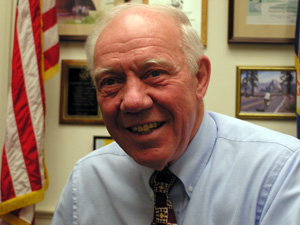Oberstar delivers a history lesson and imagination on transportation reform

Posted July 31, 2009 at 1:48PM
 There's a fascinating (if brief) interview with Rep. Jim Oberstar (D-MN), chairman of the House Transportation and Infrastructure Committee, on the PBS "Blueprint America" website. Oberstar and his committee will play a major role in the upcoming overhaul of federal transportation law, likely to be the most important piece of environmental legislation in the next session of Congress.
There's a fascinating (if brief) interview with Rep. Jim Oberstar (D-MN), chairman of the House Transportation and Infrastructure Committee, on the PBS "Blueprint America" website. Oberstar and his committee will play a major role in the upcoming overhaul of federal transportation law, likely to be the most important piece of environmental legislation in the next session of Congress.
In the interview, the Congressman (and, last I knew, bike commuter) expounds on the history of road and transit legislation in America, and what kind of reform we need to catch up with the 21st century. Here are some excerpts:
"BLUEPRINT AMERICA: What needs to happen with the national transportation system?
"REP. JIM OBERSTAR: The end of the interstate era and the beginning of a new period of transit - to give people in America something more than where the road goes, but where the people (want) to go.
"We need to transform the entire Department of Transportation to make it work . . .
"Funding is skewed away from transit and into highways because transit grew up in a different environment. It was a spin-off of railroads. It was during the 1960s, just before the creation of Amtrak. The railroads wanted to get rid of their passenger service. And they wanted to pass it off as a transit program. And secondly, transit was considered something to help the elderly and the disabled and the poor - it was a social program instead of a transportation program.
"For example, Los Angeles had one of the most extensive streetcar systems in the country. But, they tore up the tracks, put in highways, roadways, streets and paved to accommodate the car. We have suburbs because we have the car. We have exurbs because of the car. Now, we have to transform our thinking in America . . .
"We have to now transform our thinking - to link land use and development to transportation. And not require transportation to go where the land use went.
"In an urban setting, a mile of freeway may cost in the range of $46 to $50 million. The same mile of urban light rail will cost $26 million and move twice as many people - or three times as many people. And that is what we need to impress . . ."
Good stuff, and so is the rest of it, which you can access here. There is ample evidence that the American people want this, as evidenced by my colleague Justin Horner's report yesterday of a new poll showing that 77 percent of Californians want expanded transit and more efficiency measures in current roads, while only 18 percent want more roads and freeways. Meanwhile, Oberstar also says that the Moving Cooler report, coordinated by my colleague Deron Lovaas and endorsed by a range of environmental, industry, and government groups, should be a "blowtorch to the behinds" of those seeking to delay transportation reform.